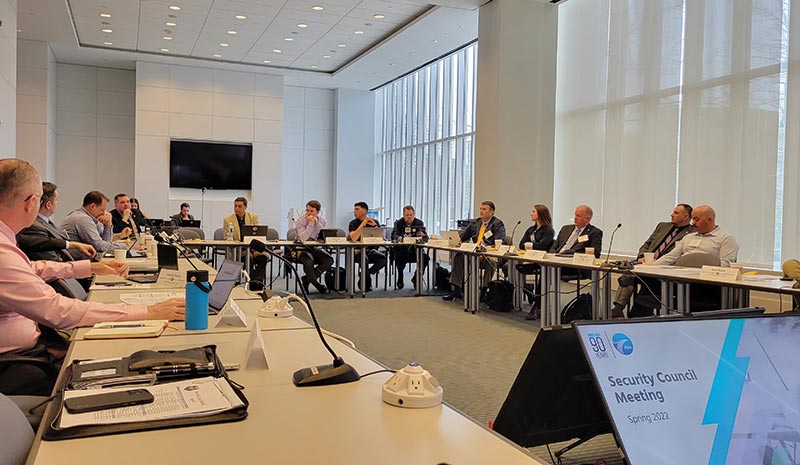Security Council Assembles, Discusses ALPA’s Top U.S. and Canadian Security Issues
ALPA at Work
By Christopher Freeze, Senior Aviation Technical Writer

Pilot representatives gather at the Association’s offices in McLean, Va., for a meeting of the Air Safety Organization’s Security Council to discuss ALPA’s top U.S. and Canadian security priorities.
Two dozen pilot representatives from 14 airlines gathered at the Association’s offices in McLean, Va., on March 22–24 for a meeting of the Air Safety Organization’s (ASO) Security Council, which included progress reports on ALPA’s top U.S. and Canadian security priorities.
Capt. Bob Fox, ALPA’s first vice president and national safety coordinator, welcomed attendees, noting that this was the council’s first in-person meeting in two and a half years. “We’ve been able to conduct the business of the Association virtually and have done it well. But nothing beats gathering in person,” remarked Fox. He shared updates regarding international issues, including Wizz Air and single-pilot operations, and the Data Action Report program.
Capt. Wolfgang Koch (Delta), the ASO’s Aviation Security chair, also greeted the pilot reps, stating, “It’s been a long time since we’ve gathered, and I look forward to this being the first of many more meetings to come.”
Capt. Eric Herman (Sun Country), the ASO’s Security Council chair, told those gathered, “At our last meeting, we discussed the uptick in disruptive and unruly passengers, and it’s been the work of this council to share our experiences and ideas regarding how to defend against and prevent these events.”
Elizabeth Baker, director of ALPA’s Government Affairs Department, and Adam Melis, a political representative in the department, provided attendees with an update on the secondary barrier requirement that was mandated as part of the FAA Reauthorization Act of 2018. “The rule, as passed by Congress, requires all newly manufactured passenger aircraft to have a secondary barrier. This requirement from Congress has been pending at the FAA since that date,” Baker stated. “We had expected some type of final rule within a year, which has since come and gone.”
“Contributions to ALPA-PAC, ALPA’s Political Action Committee, enables us to have the resources to educate lawmakers and provide support for pilot-partisan candidates,” remarked Melis. “For some on Capitol Hill, the events of 9/11 are a distant memory—if they were around during that time at all.”
Brittany Latuch, a Federal Air Marshal Service liaison to the Department of Homeland Security (DHS) Center for Countering Human Trafficking, and Michael Camal, a senior advisor to the DHS “Blue Campaign” on human trafficking, provided insights and education on current efforts to stop the practice. “There are many misconceptions about human trafficking, and it’s often confused with smuggling. It’s a crime that can happen anywhere, not just overseas,” Latuch said. “Furthermore, human trafficking can involve anyone of any age, race, socioeconomic background, gender, or nationality—victims and traffickers alike.
“Human smuggling is a crime against crossing a border and is transportation-based. It requires someone to voluntarily move from point A to point B, crossing a border against a country’s immigration.
“Trafficking, on the other hand, is a crime against the person. It’s exploitation-based, and no border crossing is required for someone to be a victim of human trafficking,” Latuch continued. “So you can be an involuntary victim within your own community.”
Latuch and Camal shared new video training material intended to educate airline and airport workers on the warning signs of potential human trafficking.
During the meeting, the pilot reps also received updates on hotels and overseas security, the Federal Flight Deck Officer (FFDO) and Known Crewmember® programs, threatened airspace, airport security screening, and pending legislation on both Capitol and Parliament Hills. In addition, they also toured the Transportation Security Administration’s Operations Center at the Freedom Center near Washington Dulles International Airport and attended a briefing from the National Counterterrorism Center.
Attendees also spent a day learning about the active-shooter phenomenon at a nearby law enforcement training facility. Led by Dr. Tammy McCracken of Violence Dynamics, the training concentrated on understanding the motivations of an attacker and developing techniques to overcome and subdue perpetrators while reducing the risk to others.
The Security Council will next meet during ALPA’s Air Safety Forum, which will be held in Washington, D.C., September 12–15.

